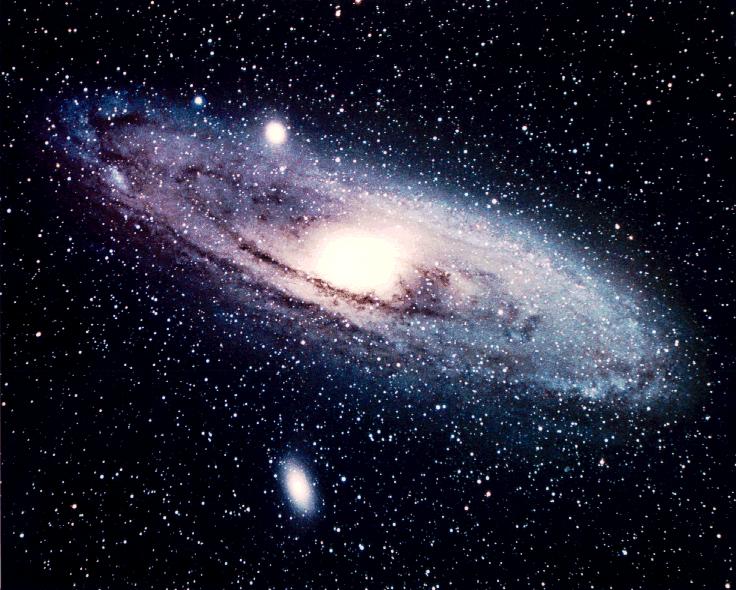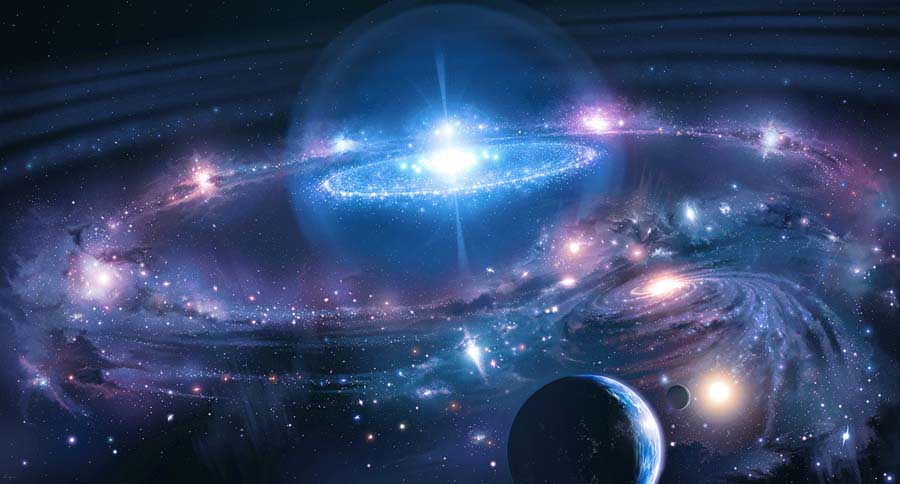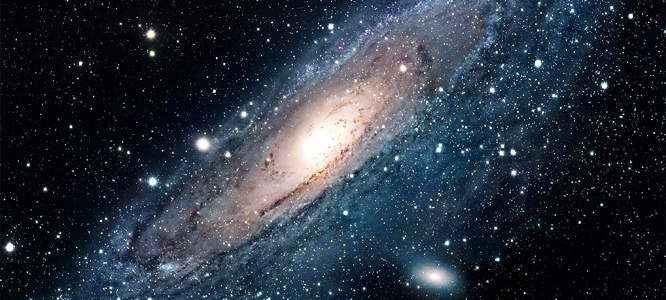Astronomy
Astronomy (Greek ἀστρονομία astronomía " star-gazing ", Astron ἄστρον of "Star" and νόμος nomos "law" ) is the science of the stars. She studied with scientific means the properties of the objects in the universe, so the celestial bodies ( planets, moons, asteroids, stars including the sun, star clusters, galaxies and clusters of galaxies ), the interstellar matter and radiation occurring in the universe. In addition, it aims to provide understanding of the universe as a whole, its formation and its construction.
Although she is only a few schools teaching subject, find the astronomy and their research results to the public much interest; Amateur astronomy is a widespread hobby. This depends on the one hand, together with the " uplifting " impression the starry sky makes for freisichtiger observation, on the other hand, with their thematic range, the touch of philosophical questions and the connection to the space.
In contrast to earlier times, the astronomy is a science now strictly separated from Astrology, who wants to close out position and movement of the stars on earthly events.
- 6.1 videos
History of Astronomy
Astronomy is one of the oldest sciences. The beginnings of astronomy are probably in the cultic worship of the heavenly bodies. In a millennia- long process initially separated astronomy and natural religion, and later astronomy, meteorology and calendar calculations, in the late Middle Ages, astronomy and astrology. Key milestones for our knowledge of the universe were the invention of the telescope 400 years ago, which completed the Copernican revolution, and later in the 19th century, the introduction of photography and spectroscopy. Since the mid-20th century, astronomers have the ability to overcome the Earth's atmosphere and to watch without their limitations, and in all regions of the electromagnetic spectrum with the human spaceflight. For this purpose, first comes the opportunity to visit the investigated objects directly and to conduct other than purely observational measurements. In parallel, larger telescopes for ground-based observations are being built.
Subjects of Astronomy
The science of astronomy is divided generally by the investigated objects, and whether the research of theoretical or observational in nature. Important basic areas of expertise include observational astronomy, astrophysics, astrometry and celestial mechanics, its main areas of investigation, the physics of the solar system, in particular the Planetary, Galactic astronomy that explores the Milky Way and its center, Extragalactic Astronomy, the structure of other galaxies and their active nuclei or gamma-ray bursts as the most energetic processes in the universe studied, as well as the relativistic astrophysics, which employs about black holes. The stellar examined birth, evolution and death of stars. The cosmology is the history and origin of the universe to the object, while the cosmogony describes the history of our own solar system. The integration of many methods entails that one the Observational Astronomy less and less after employed wavelength ranges divides ( radio astronomy, infrared astronomy, visual astronomy, ultraviolet astronomy, X-ray astronomy and gamma-ray astronomy ) because the research groups and ( ideally) and the individual scientists information from all may refer to these sources. The currently newest specialty is Exoplanetologie.
The strict methods of classical astronomy as positional astronomy by means of astrometry and celestial mechanics to explain the structure of the universe and the celestial bodies to catalog ( star catalog, ephemeris), and to explore in astrophysics, the physics of the universe and the objects in it. In addition, the space can be viewed as an experimental astronomy, and cosmology as a theoretical discipline.
Astronomy and other sciences
With astronomy very closely linked are the physics and mathematics; the subjects have often fertilized and can also be seen in astronomy study as a unit. The universe turns out in many cases as a laboratory of physics, many of their theories can be tested only in its width and in hot, high-energy objects. Last but not least were the elaborate calculations of astronomy mainspring of modern numerical analysis and data processing.
Traditionally, the cooperation of astronomy with the Geodesy ( Astro geodesy, spatial and temporal determination, reference systems, navigation), with the time and calendar accounts ( Astronomical chronology ) and with the optics ( development of astronomical instruments and sensors). Instrumental and methodologically strong references to technology, space technology and mathematics are given ( gauges, satellite technology, modeling of pathways and celestial bodies ). Geodetic methods are also applied for the determination of the gravitational field and figure of the other celestial bodies.
In recent decades, the cooperation of astronomy with the modern geology and geophysics has become increasingly important, as the work area of the geosciences covered with parts of Planetology. The mineralogy analyzes the rocks of the earth with methods similar to those of other celestial bodies. The cosmochemistry as part of chemistry deals with the origin and distribution of chemical elements and compounds in the universe and the chemical evolution, exobiology the circumstances of the origin and existence of life beyond Earth.
Furthermore, there is increasing interdisciplinary research with originally more humanities- oriented disciplines of science: The History of Astronomy as part of historical science studies the history of astronomy. Buildings and finds of prehistoric and early historic times be propagated in an astronomical context, interpreted ( archaeoastronomy ). Since astronomy also engaged in the cosmology with the questions of the origin, development and the End of the Universe, there is also intersections to theology and philosophy.










